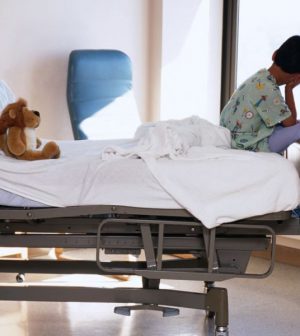- 10 Strategies to Overcome Insomnia
- Could Artificial Sweeteners Be Aging the Brain Faster?
- Techniques for Soothing Your Nervous System
- Does the Water in Your House Smell Funny? Here’s Why
- Can a Daily Dose of Apple Cider Vinegar Actually Aid Weight Loss?
- 6 Health Beverages That Can Actually Spike Your Blood Sugar
- Treatment Options for Social Anxiety Disorder
- Understanding the Connection Between Anxiety and Depression
- How Daily Prunes Can Influence Cholesterol and Inflammation
- When to Take B12 for Better Absorption and Energy
Severe Illness in Children Brings Hardship for Families

FRIDAY, Dec.31, 2021When a sick child spends time in the intensive care unit, the impact lasts even after the hospital stay is over.
Added to it are days, weeks, sometimes months out of school for the young patient and extended work absences for their primary caregivers.
“Pediatric critical illness impacts a family’s health and well-being not only during the child’s treatment but after they leave the hospital and go home,” said lead author Dr. Erin Carlton, a pediatric intensivist at University of Michigan Health C.S. Mott Children’s Hospital.
About two-thirds of young children who had ICU care for a critical illness missed school during the six months after discharge — an average of two weeks and sometimes more, the study found. About half of primary caregivers missed work as well.
“Missing that much school puts children at risk of worse academic achievements and other poor health outcomes later in life,” Carlton said in a hospital news release. “Their families may also be at increased risk of economic hardship.”
The study looked at school and work absences from 2010 to 2015 among 960 children under 18 who required ICU care, including mechanical ventilation, after respiratory failure due to such conditions as pneumonia, sepsis, infections, transplant, asthma or bronchiolitis.
Nearly 400 of them were enrolled in school. Of those, nearly 70% missed class after their hospital stay, with more than half of those meeting the criteria for chronic absenteeism.
The kids who were in the ICU longer and those with chronic illnesses were more likely to have extended school absences.
The researchers also found that nearly 53% of working parents and primary caregivers missed work during the post discharge period. About 20% of siblings missed school during the hospitalization.
“A child’s acute illness impacts not only the child but also the whole family, including siblings and caregivers,” Carlton said, adding that child and family health are closely connected and affect each other.
“When the consequences of a child’s illness spill over onto their family, it can create a chain reaction — affecting the child’s recovery and worsening their overall health,” she said.
More study is needed to better understand the financial cost of parents missing work and the stress on families, the researchers said.
Previous studies have suggested that parents with access to leave or paid benefits were more likely to miss work when needed by their child.
“Given the magnitude of missed work found in our study and the hardships described by parents in prior studies, there is a great need for programs and policies to support and protect families during and after a child’s hospitalization,” Carlton said.
She suggested children’s health providers seek strategies to improve transitions from the hospital to home and home to school.
“We need to commit to efforts to reduce barriers to school participation and absences to improve outcomes for children and their families following critical illness,” Carlton said.
The findings were recently published in JAMA Network Open.
More information
The University of Chicago Medicine offers more on what to expect when your child leaves the ICU.
SOURCE: University of Michigan Health C.S. Mott Children’s Hospital, news release, Dec. 23, 2021
Source: HealthDay
Copyright © 2026 HealthDay. All rights reserved.










